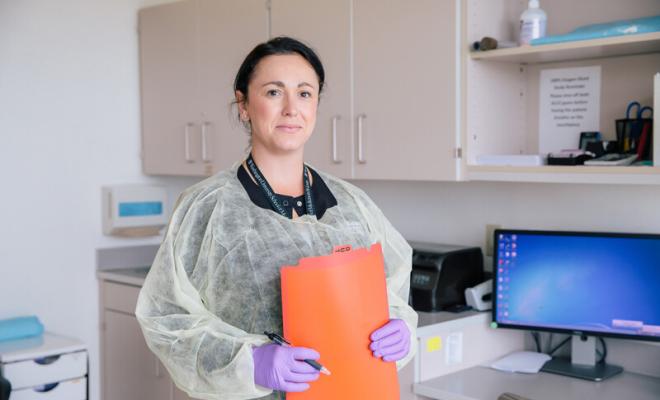Sometimes a member of your CF care team will ask you to take a single nutrient vitamin supplement, such as vitamin D. Most single nutrient vitamin
If you have questions about affording vitamin supplements, contact CF Foundation Compass by calling 844-COMPASS Monday through Thursday, 9 a.m. until 7 p.m. ET and Friday, 9 a.m. until 5 p.m. ET, or emailing compass@cff.org.
To get the most from your vitamin supplements, always take them with a meal or snack that contains fat and your
Vitamin A
Vitamin A has many roles in health. It helps the
Vitamin A can be found in animal foods such as liver, eggs, and milk, as well as in darkly colored fruits and vegetables like these:
- Carrots
- Sweet potatoes
- Cantaloupes
- Apricots
- Peaches
- Spinach
- Broccoli
Vitamin D
Vitamin D helps build and maintain strong bones and teeth by maintaining the right amount of the minerals calcium and phosphorus in your blood. Without enough vitamin D, bones can become thin and brittle. People with CF are at risk for
Exposure to sunlight provides you with some, but often not enough, of the vitamin D you need. Many people with CF need to take extra vitamin D in addition to the amount provided in CF-specific multivitamins. Other good food sources of vitamin D include these foods:
- Salmon
- Mackerel
- Canned sardines
- Tuna
- Milk
- Cereal
- Eggs
Vitamin E
Vitamin E is an antioxidant, which means that it protects compounds in the body from combining with oxygen. When compounds become oxidized, they become harmful to the body. Vitamin E also helps make red blood cells and keeps the nervous and immune systems healthy.
It is hard to get all the vitamin E you need from food alone. Some fruits and vegetables have small amounts. Most meat products do not have it at all. Vitamin supplements and the following foods can be good sources of vitamin E:
- Almonds
- Peanuts
- Mayonnaise
- Broccoli
- Margarine
- Bread (whole grain) and wheat germ
Vitamin K
Vitamin K is best known for its role in helping blood clot. Without it, a cut could bleed for a long time and a small bruise could turn into a big one. Vitamin K also helps keep bones healthy. Some of the vitamin K you need is made in the intestines, but the amount can be reduced in people who take antibiotics.
All forms of multivitamin supplements designed for people with CF include vitamin K, but not all over-the-counter multivitamins do. If you are not using multivitamin supplements designed specifically for people with CF, be sure to check the ingredient label and choose one that contains vitamin K.
To make sure you get vitamin K in your diet, eat lots of dark green, leafy vegetables. Here are some good sources of vitamin K:
- Broccoli
- Spinach
- Leaf lettuce
- Peas
- Brussels sprouts
- Coleslaw
- Kale
B-Vitamins
Vitamin B1 helps change carbohydrates into energy that the body needs every day. It is also necessary for the maintenance of healthy skin, the heart, and the nervous system.
The following foods can help you make vitamin B1 part of your daily diet:
- Pork
- Long-grain rice
- Peas
- Pecans
- Bread
- Oranges
Vitamin B2 (riboflavin) helps turn food into energy and repairs tissue. It also helps your body make healthy red blood cells. Low levels of vitamin B2 can lead to bad skin and itchy eyes.
Here are some foods that are good sources of vitamin B2:
- Milk
- Yogurt
- Eggs
- Cereal
- Pasta
- Chicken
Vitamin B3 (niacin) plays a role in metabolizing fats and is used to treat high levels of “bad” cholesterol. Vitamin B3 works with the other vitamins to keep your skin healthy and your nervous and digestive systems working right.
Although vitamin B3 is found in many foods, it is really common in poultry and dairy products. Here are some foods you can eat to get this vitamin:
- Tuna
- Peanuts
- Chicken
- Lamb
- Beef
- Pork
Vitamin B6 plays an important role in the metabolism of
Another good way to get vitamin B6 is to eat chicken, pork, beef, and fish. You also can find B6 in these foods:
- Eggs
- Baked potatoes
- Bananas
- Garbanzo beans (chickpeas)
- Oatmeal
Vitamin B9 (folic acid) plays a role in the production of
Folic acid is found in many vegetables and fruit juices, but if these foods are cooked too long, they lose a lot of B9. That is why you may need a vitamin supplement plus a healthy diet with foods such as:
- Lentils
- Asparagus
- Spinach
- Cereal
- Peanuts
- Orange juice
You need only a small amount of vitamin B12 in your diet, but that small amount protects your nerve cells. It is also needed to form red blood cells. Vitamin B12 deficiency can cause a type of anemia known as pernicious anemia, which is commonly found in the elderly and in strict vegetarians.
Beef and seafood are good sources of B12. But if you do not eat animal products, you may not get enough B12 and should take vitamin supplements. Here are some food sources of B12:
- Salmon
- Beef
- Tuna
- Milk
- Pork
- Chicken
Vitamin C
Vitamin C does hundreds of jobs in the body. It is an antioxidant, meaning it helps keep the cells in your body healthy. Vitamin C also helps make collagen, a sticky substance that keeps your bones and muscles together and helps blood vessels stay strong. It also can help heal a wound.
Our bodies need a diet rich in vitamin C foods to stay healthy. The good news is that vitamin C is found in many fruits and vegetables, such as:
- Broccoli
- Grapefruit
- Oranges
- Strawberries
- Cantaloupes
- Mangoes
Pantothenic Acid
An enzyme maker called pantothenic acid helps metabolize fats, carbohydrates, and proteins. It also helps make red blood cells and control the body's hormones. Low levels of pantothenic acid can lead to stomach cramps, vomiting, and tingling in the hands and feet.
Pantothenic acid is found in many foods that are a part of a daily diet. Here are some ideas:
- Avocados
- Mushrooms
- Chicken
- Lentils
- Potatoes
- Eggs
Biotin
Some
There are lots of ways to get the biotin you need every day. In addition to the biotin that your body makes, vitamin supplements have good amounts. There are many common foods that have it as well, such as these:
- Milk
- Chocolate
- Eggs
- Cheese
- Bacon
- Chicken
Parts of this document were adapted, with permission, from material written by Suzanne Michel, MPH, RD, LDN.


